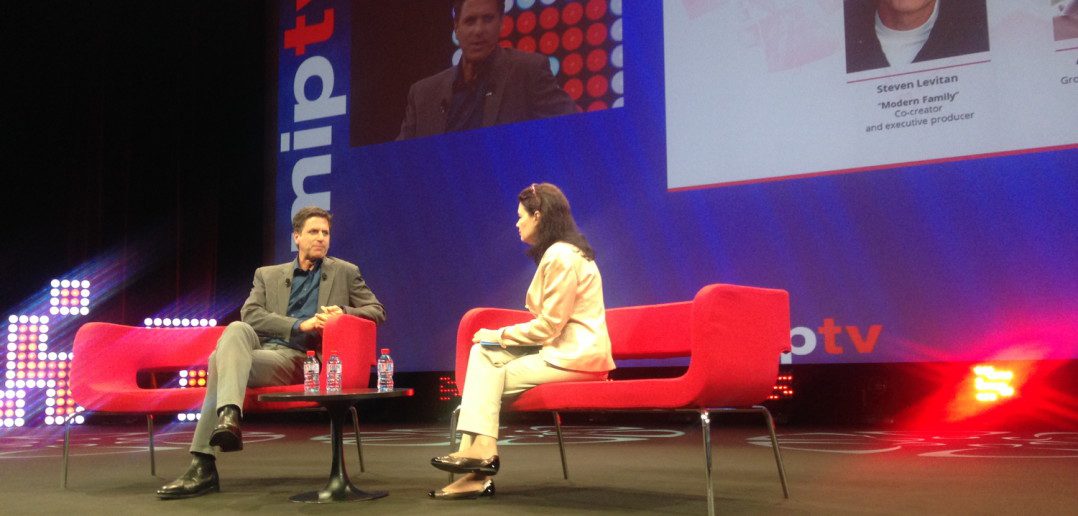Above: Steven Levitan, who co-created and executive produces « Modern Family », and moderator Anna Carugati, group editorial director of World Screen.
Writer, producer, director and creator Steven Levitan has made TV comedies for over 20 years. His credits include Wings, Frasier, The Larry Sanders Show, Just Shoot Me (creator), and Greg the Bunny. But in this keynote he focused on Modern Family and how it managed to carry successfully from the States to the global arena.
Carugati kicked off with a basic question: How does the show work?
The writers gather up in June, Levitan began. There are 15 writers on show, and each episode takes five days to shoot. They do three in a row, then give actors a week off, during which writers can catch up on the episodes to follow. This continues through March.
« The hours are pretty good on our show because we don’t overshoot, » he said. « We’re not a big production-heavy show. We shoot two cameras at once; it’s the best way to capture the comedy. We’re not big on fancy camera work. »
This provides a reality TV vibe, which Levitan feels works because those shows « were so en vogue and things just feel a bit more real. »
That sense of spontaneity is also key to the deep belly laughs Modern Family produces. « We just wanna capture the comedy in the most spontaneous way possible, and that happens best early on, not after the 30th take, » said Levitan.
Many situations are inspired by personal experience, with Levitan quipping, « What was it like for my daughter when she immediately walked in… » — on he and his wife having sex? (A cringe-worthy episode that many can identify with!)
He also talked about using an ensemble cast, which can be difficult to manage on any kind of show. « We’ve been on air for 6 years and we cast 10 actors, » said Levitan. « To cast 10 actors in a pilot when the rest of the world is casting, and to not for one second even consider recasting anybody, is a minor miracle. It doesn’t happen. Fate was smiling on us; there were so many different ways we could have screwed up—like if we’d cast the wrong Claire with the right Phil and vice-versa. »
But that wasn’t entirely magic either. Casting director Jeff Greenberg (Cheers, Frasier) saw about 1,400 actors for the roles on the show. It was a long process.
Carugati then asked whether diversity was part of the show’s original plan.
« Originally the show was called My American Family, told through eyes of a Dutch documentary filmmaker, » Levitan revealed. A first pilot was written but the filmmaker—an intentional outsider—was quickly lifted out, and the show became a more introspective examination of what families look like today.
« What was interesting about [gay families we knew] was that one couple we know is the longest-lasting couple we know, » said Levitan. « They’re not fit and fabulous like in Will & Grace… they’re more like us than had been previously portrayed. That was a good place to start. We wanted to show that kind of family. »
The scope of the show also evolved. « We wanted to show three families… we stumbled on the idea of two siblings and their father who was starting a new family, because so many older men in LA have begun starting second families, getting a chance to redo it. »
Each family is an archetype of a new kind of modern family. The Dunphys, for example, show how the traditional family is changing, especially in the face of technology. One episode of Modern Family takes place entirely on Claire’s computer screen.
Inspiration from that came from Levitan’s own life. « Me and my daughters Facetime quite a bit, » he said. « One day I was talking to one on my computer screen. There they were, my wife was behind me talking, I had some emails and a webpage open, maybe a script. It just dawned on me that this is an amazing glimpse of my life—you can tell so much about me based on what’s on this screen. »
Ageing on-screen is also a huge challenge when working with a cast that includes a lot of kids, Carugati noted.
« When you’re with these kids everyday, you don’t see it, » Levitan admitted, « but it’s one of the challenges: They’re getting older. Kids go through awkward stages in real-life, and what made them super-cute and funny at 10 is completely different at 16. It’s a challenge for us to grow with that. We don’t have the benefit of ‘The Simpsons’ where they’re frozen in time. »
But the talent is great, he added, and the rest is up to the writers to find new ways for the show to evolve. « As their lives change, it’ll force the show to change. Hopefully it’ll keep it fresh. »
Carugati pointed out that « Modern Family » is now in its sixth season and has already won five Best Comedy Emmys. How does Levitan keep it fresh, and is there more pressure to win Emmys?
« I don’t expect we’ll keep winning; it would boggle the mind, » Levitan laughed. « It’s probably time… somebody will want to end our fun ride. But there is a lot of pressure. We realise how lucky we are. »
You can bring together an amazing group of people, he added, « and for some reason it just doesn’t magically line up. That’s why this is such a rare thing. Every once in awhile, something magical happens. And you just have this crazy combination of things, and things just fall into place. It’s almost out of your control. »
Luck isn’t the biggest part of Modern Family’s success, but he believes it played a starring role.
« You’ll make 10,000 decisions in the course of making a pilot. And you could make 9.999 correctly, but if you make one key decision wrong, it could sink the whole thing, » Levitan said. « There are so many ways to fail, and so few ways for things to come together like this, it’s just a ridiculous anomaly. So we feel pressure to honour that. »
That isn’t to say they’re surrendering to the whims of destiny, either. « We don’t want to hear Modern Family is limping out, » he stressed. « We work extra-hard to say, how can we continue to innovate or tell a story in a new way? What’s an idea that hasn’t been done before, or that hasn’t been done well before? » His favourite episodes are about « little observations » drawn from real life: « Little things that happened that are new, or just very real, and I don’t think anyone has touched on it. »
Finally, Carugati asked, how has it traveled internationally?
The team didn’t worry about scaling the story, Levitan divulged. The position was always « Let’s tell our story honestly and not worry about trying to make it more universal. » He cited the episode where the kids learn to ride a bike: « That’s how we taught our kids to ride a bike, » he said.
In the end, there isn’t much difference between any of us anyway, he decided.
« Whether you’re living in West Side LA, in the middle of Ohio in the rustbelt having tough times; in Europe, Asia or another country, that family experience is pretty universal, » he pointed out. « Everybody’s trying to raise their kids. Everyone wants the best for them. Everyone overthinks it a little. And everyone is struggling with how families are changing.
« As long as we stick with that—here’s our experience, we’re living this—it’s become amazing to me how small the world is, and how much we have in common at day’s end. »
Check out MIPTV, MIP Digital Fronts, MIPDoc & MIPFormats 2015 full live coverage




